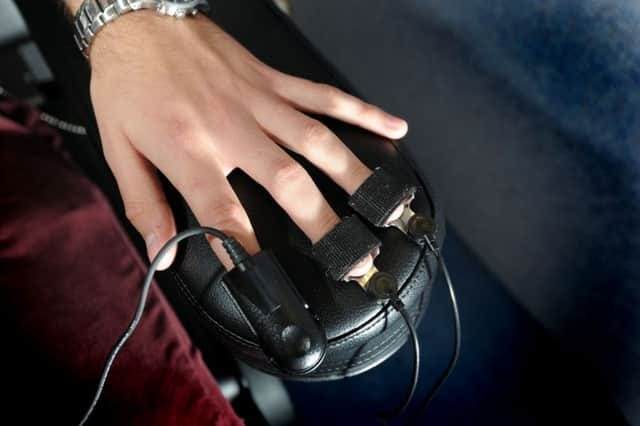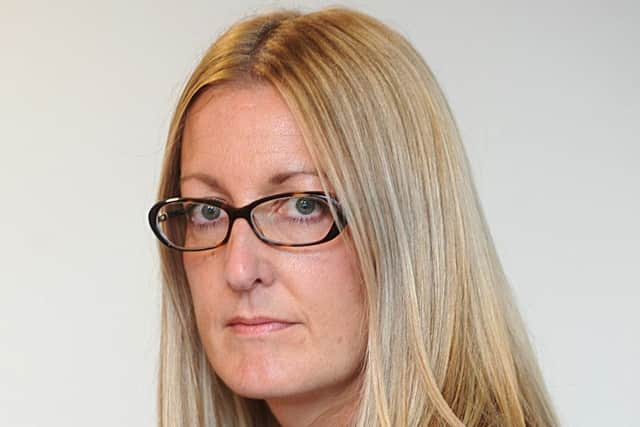One in five sex offenders fail Yorkshire police force’s lie detector tests


South Yorkshire Police, one of only two forces in the country using polygraphs, has carried out 92 tests in its first year of usage – with 18 delivering responses that indicated offenders were lying.
The force said two of the tests were halted after offenders made admissions which prompted one to be immediately arrested and another’s computer to be seized.
Advertisement
Hide AdAdvertisement
Hide AdOfficers have also found the tests, which monitor blood pressure, breathing and perspiration, have encouraged sex offenders to make admissions prior to undergoing a polygraph in the knowledge that dishonesty is likely to be detected.


Detective Inspector Delphine Waring, who heads South Yorkshire’s Violent and Sex Offender Register (ViSOR) unit, said: “There was a degree of cynicism when we first started. But the results have spoken for themselves. We’ve been able to show concrete examples of how the polygraph has worked and how it has delivered results.”
Although 60 of the 92 tests were classed as passed, in 45 of those cases offenders revealed previously unknown information about their lifestyle by simply telling the truth during the polygraph process.
Even in the 18 tests that were classed as failed, 13 divulged information at either the pre-test or post-test interview which is a standard part of the process. Nine of the polygraphs were classed as inconclusive, two were invalid and one was stopped after an offender became aggressive.
Advertisement
Hide AdAdvertisement
Hide AdAll offenders undertake a pre-test interview to prepare the ground for the upcoming questioning. In one case, a child sex offender admitted seeking out a potential victim and viewing indecent images, at which point the process was stopped. He was immediately arrested, his home searched and he was subsequently charged.
The polygraph scheme works on a voluntary basis and offenders are told they can withdraw from the process at any point. They are also advised that any admissions of criminal behaviour will result the process being halted and their potential arrest.
Results cannot be used at court but an admission during the process will lead to a police investigation to gather evidence that could be.
The majority of tests – 85 – involved individuals already on the sex offenders’ register. The remaining seven were taken up by people arrested on suspicion of possessing indecent images of children – the other category the force offers polygraphs to.
Advertisement
Hide AdAdvertisement
Hide AdAlthough the process can uncover evidence of fresh offending, the central aim is managing the risk offenders pose in the community. Information gleaned from the test is fed back to managers responsible for monitoring offenders to help gauge the danger they pose. Information can also be shared with other agencies to protect vulnerable people.
Hertfordshire is the only other police force using polygraphs to monitor sex offenders.
South Yorkshire Police has faced severe criticism for failing victims of child grooming in the national scandal centred on Rotherham.
But promising results from the use of polygraphs suggest the force may have obtained a useful tool in tackling the risk that known sex offenders pose.
Advertisement
Hide AdAdvertisement
Hide AdDC Richard Chambers, one of two officers trained to carry out polygraphs, claimed a “placebo effect” had resulted in 63 per cent of those taking tests making admissions during the process.
In many cases, it seems the chance of being caught lying is enough for offenders to tell the truth, often in the pre-test interview.
“The prospect of undergoing the polygraph has encouraged people to ‘clear the decks’ and divulge information they’ve not told their offender manager about,” DC Chambers said. “It could be relationships they’ve started, unauthorised or unsupervised access to children or thoughts they’ve had about potentially offending again.”
The decision to invest in polygraph testing was taken by former Police and Crime Commissioner Shaun Wright in 2013, the year before the furore surrounding the Rotherham scandal led to his resignation.
Advertisement
Hide AdAdvertisement
Hide AdThe kit itself is relatively cheap with the two sets of monitoring equipment and a specially-adapted laptop for each of the trained examiners costing a total of just £5,000.
A further £35,000 was invested in training for the two officers over an 11-week course in the US, where polygraph usage is far more widespread.
Mr Wright’s successor, Alan Billings, welcomed the first year of tests following their introduction last September.
A spokesman said: “We are proud that South Yorkshire was one of the first two police forces in the UK to use this innovative development in sex offender risk management.
Advertisement
Hide AdAdvertisement
Hide Ad“This ground-breaking technology is helping us to protect the public and safeguard potential victims, whilst at the same time aiding offender management. The tool provides valuable opportunities to safeguard and protect children who are subject of sexual abuse.”
Results in South Yorkshire have led to interest from other forces and progress is being monitored by Cumbria Deputy Chief Constable Michelle Skeer, the lead on managing sexual offenders at the National Police Chiefs Council.
But Ms Skeer said: “Polygraph techniques are complex and are by no means a single solution but they are along with many others a useful tool for managing the risk of sexual offenders.”
Polygraph testing for sex offenders in the UK was piloted from 2009 to 2011 by the Probation Service in the Midlands. Hertfordshire Police, the only force other than South Yorkshire to use the technique, became the first to do pilot testing in 2011.
Advertisement
Hide AdAdvertisement
Hide AdIn 2013, the Government decided that the National Probation Service would introduce mandatory polygraphs for sex offenders posing the most serious risk.
The police polygraph is offered to individuals on the sex offenders’ register who served sentences of less than 12 months in prison, including those who have completed their custodial or community sentence but remain on the register.
In total, South Yorkshire Police manages 1,180 offenders on the register who are living in the community, working with other agencies such as probation and social services. Since testing began last September, 331 offenders have been approached to undertake polygraphs.
Separate mandatory polygraphs introduced by the National Probation Service last autumn have led to 63 out of 492 offenders returning to prison as they were found to have breached terms of their licence.